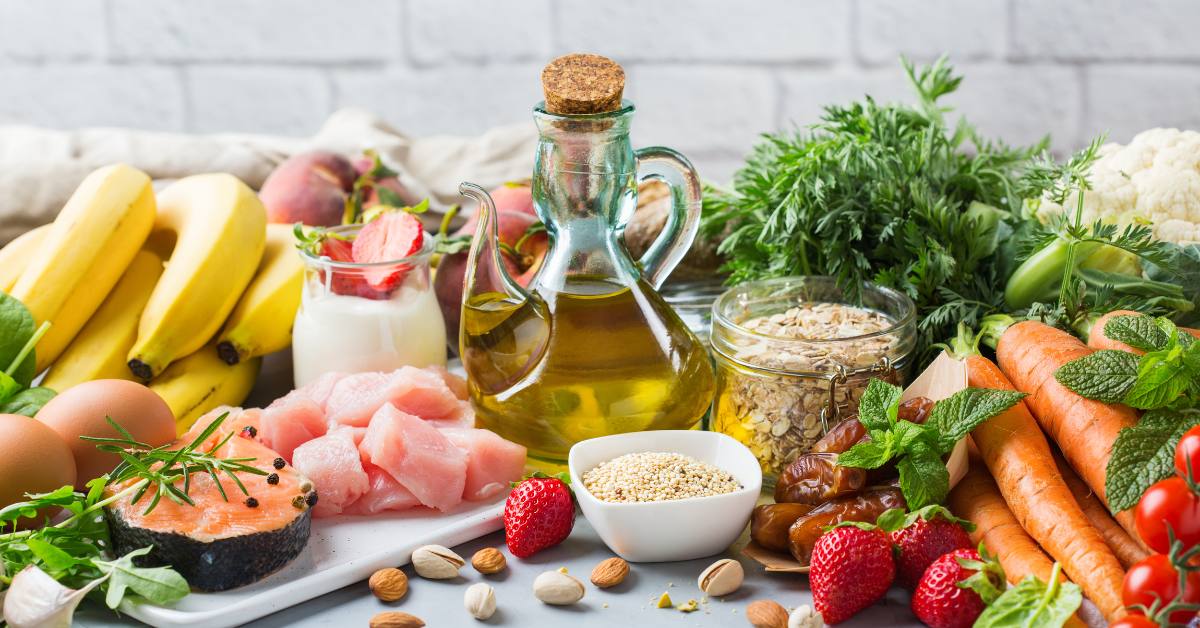A Fuel for Strength Series celebrating Nutrition Month
Right now, the vast amount of information available online is creating unnecessary fear about food choices, especially when it comes to processed foods. Eliminating all ultra-processed foods isn’t practical for most people, nor does it have to be the goal. Rather than focusing on what not to eat, think about what you can add—like more fibre, whole foods, and colourful variety.
Ultra-processed foods are everywhere — from frozen pizzas to packaged cookies. But what are they, and how do they impact your health?
As a Registered Dietitian with TELUS Health MyCare, I often get asked if ultra-processed foods are that bad for us. Groceries are expensive these days, and processed foods can be the cheapest and fastest option.
The short answer is if you only eat ultra-processed foods, your body isn’t getting the nutrients it needs to stay healthy. The more whole foods you eat, the easier it is for your body and mind to stay healthy, fight colds, and prevent diseases and other health issues.
However, it’s also important not to stress about every food decision. Read on to learn how to eat less ultra-processed foods without eliminating them altogether.
What does ‘ultra-processed foods’ mean?
Ultra-processed foods have been significantly altered from their original whole-food form. Essential nutrients like fibre, vitamins, and minerals are stripped away during the process.
Then, additives are introduced to improve taste, texture, shelf life, and appearance. These may include:
- Artificial colours and flavours
- Preservatives to extend shelf life
- Stabilizers and emulsifiers to maintain texture
- Excess sugar, salt, and unhealthy fats to enhance flavour
Some manufacturers add nutrients to their products. Food enrichment restores nutrients lost during processing, while fortification adds nutrients not originally present to boost nutrition.
Adding nutrients such as folate, iron, and calcium can help you get enough of these important nutrients. However, adding vitamins and minerals to processed foods doesn’t always make them the best choice if they’re still loaded with extra salt or sugar.
The easiest way to identify ultra-processed food is to check the ingredient list. It likely falls into the ultra-processed category if it contains a long list of ingredients you wouldn’t find in a typical kitchen, like high fructose corn syrup, artificial colours or flavours, or hydrogenated oils. Some common examples of ultra-processed foods include sugary breakfast cereals, frozen meals, packaged snacks, and sodas. (Here are some healthier breakfast options.)
Even if it says “healthy” or “natural,” reading the label is still a good idea. The ‘health halo’ effect is a marketing ploy that can be misleading since whole foods don’t need marketing. You won’t see “natural” on a carrot or “high in fibre” on an apple.
Minimally processed foods, like canned beans, tomatoes, frozen vegetables, and whole-grain bread, can be great additions to a healthy diet.

5 reasons to cut back on ultra-processed foods
While ultra-processed foods offer convenience, they also come with hidden costs that can affect your immediate well-being and long-term health when they make up the majority of your diet.
Here are five compelling reasons to cut back on these products:
1. Lack of fibre = digestive issues
Ultra-processed foods are stripped of fibre, which you need for good digestion and to help you feel full for longer. When you digest food too quickly, it’s easy to overeat.
Diets low in fibre can also lead to constipation, bloating, stomach discomfort and poor gut health, which may be linked to chronic diseases like high cholesterol, type 2 diabetes, anxiety and depression.
2. Made to be addictive
Ultra-processed foods are made to taste so good that people find it hard to stop eating them. This is done by adding loads of sugar, salt, and fat. Craving these foods isn’t a lack of willpower; it’s marketing at its finest.
3. Cause feelings of irritability and difficulty focusing
Many ultra-processed foods are high in refined carbs and added sugars that cause quick spikes in blood sugar — which give you a short burst of energy — followed by a sharp drop. Blood sugar crashes trigger the release of stress hormones like cortisol and adrenaline, which can leave you feeling anxious, irritable, or unfocused.
4. Sugar-free doesn’t mean it’s healthy
It’s a good idea to cut back on added sugars, especially those in regular sodas and energy drinks; however, artificial sweeteners are often not the better choice.
Artificial sweeteners can negatively impact gut health. Some research suggests that sugar substitutes alter gut bacteria and won’t help with sugar cravings in the long run. Sweeteners can actually make it more challenging if you’re trying to reduce how much sugar you consume.
5. Processed meats increase colorectal cancer risk
Meats like bacon, hot dogs, and deli meats contain added fat, salt and sodium nitrates, which have been linked to a higher risk of colorectal cancer.
The no-stress method for eating healthier
Instead of avoiding certain foods, focus on whole foods that you can easily add to your diet—think extra fibre and a vibrant mix of colours. Here’s how to eat less ultra-processed foods without giving them up entirely.

1. Follow the 80/20 rule
Aim to fill 80% of your shopping cart with whole foods and 20% with processed foods. If most of your diet is made up of whole foods, it’s okay to enjoy some processed foods, too.
2. Add fruits and veggies to what you already eat
Find easy ways to add fruits and veggies to your existing meals. For example, add fresh veggies to frozen pizza or pair it with a salad.
3. Cut back gradually so you don’t feel deprived
This can be more sustainable than trying to eliminate ultra-processed foods altogether. Making small changes is important because it helps create habits that stick. You’re less likely to feel overwhelmed, and you reduce the risk of burnout that often accompanies drastic overhauls.
4. Use ready-to-eat whole foods
Pre-cut veggie trays are easy to snack on or add to meals. Frozen fruit can be added to smoothies, oatmeal and yogurt. Frozen vegetables are as nutritious as fresh ones and require no prep.
5. Eat more whole foods without cooking from scratch
Many people think eating whole foods requires complicated cooking, but it doesn’t! Buy a pre-cooked rotisserie chicken, use canned beans or lentils to add protein and fibre to meals, swap white bread for whole grain bread or grab a handful of nuts or seeds as a snack instead of a store-bought granola bar.
6. Buy food that is in-season
Fruits and vegetables are often cheaper to buy when in season. Plus, seasonal produce is fresher and tastes better because it retains more nutrients than out-of-season produce–which is often shipped long distances. It’s easier to eat more fruit and veggies when they taste delicious.
7. Eat the ‘whole foods rainbow’
The more variety in your diet, the better. Each colour in fruits and vegetables represents different vitamins, minerals, and antioxidants that support brain function, immune strength, and disease prevention.
Many clients find it easier to think about adding colours to their meals rather than obsessing over specific nutrient counts. Aim to eat the rainbow of whole foods over the week.
8. Food is meant to be enjoyed
Find combinations of foods you like, and don’t be afraid to experiment and try new flavours or cooking methods to find dishes that taste good for you. If you enjoy what you eat, you’re more likely to stick to a healthy diet.
In my experience, the more whole foods you eat, the more you’ll start to crave them naturally as you start feeling the difference in your body, like more energy, less afternoon energy crashes, and better digestion.
9. Something is still better than eating nothing
If you’re struggling to prepare meals, a frozen meal is better than skipping meals altogether, especially if you’re short on time or struggling with mental health challenges. If you notice that you often struggle to get the nutrition you need, reaching out for support can help.
Success stories
Many clients who have reduced their ultra-processed food intake have noticed significant health and well-being benefits.
For example, cutting back on sugary drinks improved some clients’ blood sugar levels and energy throughout the day. Others who reduced their salt intake found that ultra-processed foods started tasting overly salty, and they enjoyed the natural flavours of more foods again.
One client who cut back on processed snacks like chips and cookies noticed that after a while, whole foods like fruits and vegetables started tasting better and felt more satisfying. He also noticed that his time in the bathroom was easier!
The takeaway
Remember to keep it simple. Simplifying your approach to food makes healthy eating more sustainable. Instead of focusing on restrictions, think about what you can add to your diet to improve nutrition.
Next time you’re at the grocery store, check the ingredients, add more whole foods to your cart, and remember—it’s all about progress, not perfection!
Visit Dietitians of Canada and learn about Nourish to Flourish: a Nutrition Month campaign highlighting how food brings us together, supports mental health, and nurtures communities.
Do you have a story about cutting back on ultra-processed foods? We’d love to hear it in the comments below!






I have humus in a whole-grain bread sandwich almost every day, plus a second sandwich of peanut butter and either marmalade or honey, followed by an apple for dessert. Is this a healthful lunch? I also have a snack in the afternoon or early evening of Wasa crackers with nut butter and honey. Is this a healthful snack? I am 90 years old.
Hello Manuel! Here’s what Cara has to say:
“Hi! It sounds like you’re eating very well for your age and including some great choices for fibre (whole grains, crackers, fruit) and protein (hummus, nut butters) into your diet. Keep up with the balanced meals and snacks, as long as you’re enjoying the foods and they’re leaving you feeling full and satisfied.”
~The Don’t Change Much team
Yes I totally enjoyed your comments of eating healthy. With so much flu and resparority illnesses coughing seems to continue for weeks on end. What is your opinion on using Organika Bee Propolis to sooth the throat erritation ?
Thanks, Gloria! We don’t have any information on that particular product. It’s always best to check in with your healthcare provider to see if it’s a good fit for you based on your personal medical history.
~ From the Don’t Change Much team
Great article! I like how it was broken down in easy understand terms.
Great learned a lot good info